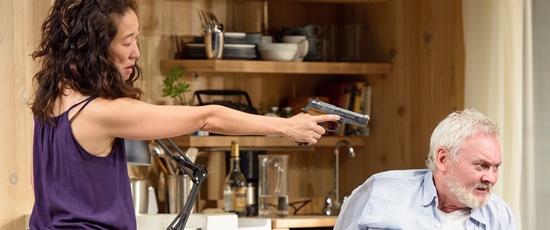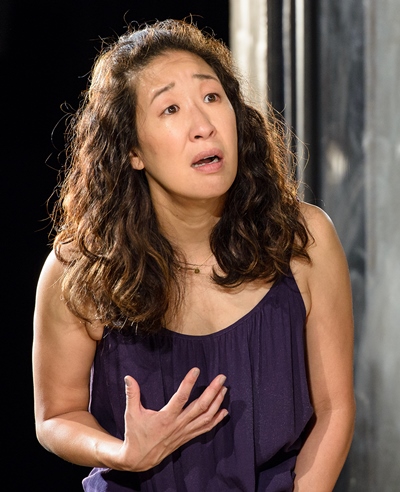‘Death and the Maiden’ at Victory Gardens: Seeking peace and Schubert in web of horror
 Review: “Death and the Maiden” by Ariel Dorfman, at Victory Gardens Theatre through July 20. ★★★
Review: “Death and the Maiden” by Ariel Dorfman, at Victory Gardens Theatre through July 20. ★★★
By Lawrence B. Johnson
The premise, like the title, is intriguing and the famous visiting star lives fully up to her billing, but Ariel Dorfman’s play “Death and the Maiden” is a problematic work that isn’t helped by an uneven production at Victory Gardens Theatre.
 Sandra Oh, perhaps best known as Dr. Cristina Yang in the television series “Grey’s Anatomy” and for the film “Sideways,” is magical as Paulina Salas, a woman who survived unjust imprisonment, torture and rape under the old regime of a South American republic – only to find her former tormentor in the affable fellow, indeed good Samaritan, now before her in her own home.
Sandra Oh, perhaps best known as Dr. Cristina Yang in the television series “Grey’s Anatomy” and for the film “Sideways,” is magical as Paulina Salas, a woman who survived unjust imprisonment, torture and rape under the old regime of a South American republic – only to find her former tormentor in the affable fellow, indeed good Samaritan, now before her in her own home.
Or at least she’s pretty sure this man Roberto Miranda (John Judd) is the icy doctor who repeatedly administered electrical shock and raped her during her long ordeal some 15 years ago. She recognizes his voice, for one thing, as well as some peculiar expressions he still uses – those things and his fondness for Schubert, whose String Quartet in D minor (“Death and the Maiden”) the doctor would play in the background while abusing her.
But Paulina’s husband Gerardo Escobar (Raúl Castillo), a lawyer, is shocked and – to put it mildly – cautionary when he discovers her pointing a hefty pistola at the head of this man who earlier the same evening had stopped on the road to help him deal with a flat tire.
Paulina answers her husband’s pleas to back off by declaring that she will indeed do that – and let the doctor go – when he has signed a detailed confession of his crimes against her. For his part, the terrified physician insists he has no idea what she’s talking about. And so begins Paulina’s psychological siege of the suspect she has lashed to a chair.
 We first meet the couple alone, late in the evening, sniping at each other over the jack Paulina removed from the car to give to her mother, thus leaving Gerardo stranded except for the kindness of a guy who stopped and helped him out of his predicament.
We first meet the couple alone, late in the evening, sniping at each other over the jack Paulina removed from the car to give to her mother, thus leaving Gerardo stranded except for the kindness of a guy who stopped and helped him out of his predicament.
It is not a happy seeming marriage. Paulina’s words and actions appear mechanical, nearly devoid of emotion. Gerardo likewise seems detached, even as he is remonstrative. If there ever was heat in this match, it has long since gone cold.
Gerardo informs Paulina that, under the new democratic government, he has been offered the lead position for an inquiry into the human rights abuses of the old military regime, which has ceded authority though its officers still run the army. Everyone will be allowed to come forward and bear witness – but there will be no punishments. There will be testimony, but no accountability. It will at least be something, a place to begin a national healing, a way to move forward, he says.
It’s all quite talky and, here at least, quite flat. While Sandra Oh’s portrait of the deeply traumatized woman as emotionally bereft is plausible, Castillo doesn’t provide the inflected energy required to keep the scene afloat. Alas, his monochromatic delivery never really breaks out into shades of emotion. His voice will grow louder, but his expression remains narrowly bounded.
 Oh, however, blossoms the moment Paulina confronts the doctor alone, in the middle of the night, while her husband sleeps. Knowing Gerardo has no spare tire, the doctor has come to the house to offer further assistance. Overhearing this exchange from the next room, Paulina is mortified at spotting what she believes is the sadistic doctor’s voice. Gerardo insists that the doctor sleep on the couch; Paulina, he says, makes a great breakfast.
Oh, however, blossoms the moment Paulina confronts the doctor alone, in the middle of the night, while her husband sleeps. Knowing Gerardo has no spare tire, the doctor has come to the house to offer further assistance. Overhearing this exchange from the next room, Paulina is mortified at spotting what she believes is the sadistic doctor’s voice. Gerardo insists that the doctor sleep on the couch; Paulina, he says, makes a great breakfast.
But rather than eggs, in the dead of night Paulina serves her guest the skillet alone, ties him up, confronts him with her imposing pistol and accuses him. As she has gagged him, what follows becomes a monologue fraught with irony that Oh delivers with riotous understatement. This Paulina sounds seriously troubled, and constantly veers toward violence, but she’s also very funny.
 Perhaps it’s inevitable that “Death and the Maiden” settles into essentially a one-woman show, but that is precisely what befalls here. The playwright loves Paulina, who just wants to be able to listen to Schubert’s music again without that unspeakable association; and his rhetorical imagination rises to meet her crisis. The two men, however, are substantially reduced to, in the one case, imploring Paulina not to do something rash and, in the other, variations on “I didn’t do it, I tell you, it wasn’t me.” And whereas Judd brings emotional depth to the suspect doc, director Chay Yew has not found a way into Camillo’s flat-lined lawyer.
Perhaps it’s inevitable that “Death and the Maiden” settles into essentially a one-woman show, but that is precisely what befalls here. The playwright loves Paulina, who just wants to be able to listen to Schubert’s music again without that unspeakable association; and his rhetorical imagination rises to meet her crisis. The two men, however, are substantially reduced to, in the one case, imploring Paulina not to do something rash and, in the other, variations on “I didn’t do it, I tell you, it wasn’t me.” And whereas Judd brings emotional depth to the suspect doc, director Chay Yew has not found a way into Camillo’s flat-lined lawyer.
How all this plays out is for each viewer to decide. The playwright’s deliberate ambiguity is arguably the most fascinating aspect of the play. Not so enticing is Dorfman’s awkward final scene, in which we find Paulina’s husband conversing with someone indeterminate. It’s a perplexing device as undramatic as it is imponderable. Cue the D minor Quartet.
I loved set designer William Boles’ charming waterfront bungalow, which revolves to create new perspectives as well as opportunities to eavesdrop. Hats off also to lighting designer Jesse Klug.
And I can’t help mentioning how much the petite, slim figure of Sandra Oh reminded me of Japanese pianist Mitsuko Uchida – one of the world’s consummate interpreters of Schubert.
Related Link:
- Performance location, dates and times: Details at TheatreinChicago.com
- The life and times of playwright Ariel Dorfman: Read about him here
Tags: Ariel Dorfman, Chay Yew, Death and the Maiden, Jesse Klug, John Judd, Raul Castillo, Sandra Oh, Victory Gardens Theatre, William Boles

